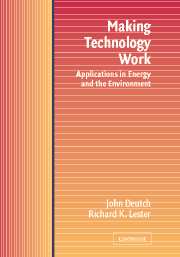Book contents
- Frontmatter
- Contents
- Preface
- 1 Introduction
- 2 Gasohol
- 3 Solar Thermal, Windpower, and Photovoltaic Technologies
- 4 Electricity from Coal
- 5 Controlling Acid Rain from Coal-fired Power Plants
- 6 Greenhouse Gases and Global Warming
- 7 Nuclear Power and Its Fuel Cycle
- 8 Managing Nuclear Waste
- 9 Nuclear Power and Weapons Proliferation
- 10 Natural Gas
- 11 Safety and Risk: Examples from the Liquefied Natural Gas and Nuclear Industries
- 12 Synthetic Fuels
- 13 Fuel Cells For Automobiles
- 14 Energy Models and Statistics
- 15 The Government's Role in Innovation
- 16 Conclusions
- Index
2 - Gasohol
Published online by Cambridge University Press: 10 December 2009
- Frontmatter
- Contents
- Preface
- 1 Introduction
- 2 Gasohol
- 3 Solar Thermal, Windpower, and Photovoltaic Technologies
- 4 Electricity from Coal
- 5 Controlling Acid Rain from Coal-fired Power Plants
- 6 Greenhouse Gases and Global Warming
- 7 Nuclear Power and Its Fuel Cycle
- 8 Managing Nuclear Waste
- 9 Nuclear Power and Weapons Proliferation
- 10 Natural Gas
- 11 Safety and Risk: Examples from the Liquefied Natural Gas and Nuclear Industries
- 12 Synthetic Fuels
- 13 Fuel Cells For Automobiles
- 14 Energy Models and Statistics
- 15 The Government's Role in Innovation
- 16 Conclusions
- Index
Summary
This chapter considers the question: Should national energy policy encourage the growing of corn to produce gasohol? Gasohol is the product of the conversion of corn or sugar to ethanol (ethyl alcohol), which is employed as a gasoline additive. Ordinarily, the term gasohol refers to a mixture of 10% ethanol and 90% gasoline. The idea of gasohol in current U.S. policy is simple: Use ethanol from corn to displace a portion of the gasoline for motor vehicles, thereby substituting a renewable energy source (corn) for a depletable energy source (petroleum). Because the purpose of government support for gasohol is to substitute for petroleum, we focus on the petroleum fuel and undertake a careful energy balance comparing the petroleum needed to produce gasohol with the petroleum that the gasohol displaces. The point is to identify the net petroleum displaced by gasohol.
TECHNICAL ASPECTS OF GASOHOL
The production of ethanol from corn requires several steps. First, the corn must be grown; then the starch (long-chain macromolecules made up of six-carbon sugars) must be separated from the corn. The starch is then hydrolyzed to glucose, which in turn is fermented to form ethanol. Finally, the ethanol is separated from the fermentation liquor by distillation.
Each of these steps requires energy. Much of the energy required for growing the corn comes from sunlight. But the intensive form of agriculture practiced in the United States, which results in high crop yields, requires a considerable amount of expensive premium fuels for fertilizers, farming, and harvesting.
- Type
- Chapter
- Information
- Making Technology WorkApplications in Energy and the Environment, pp. 9 - 16Publisher: Cambridge University PressPrint publication year: 2003



